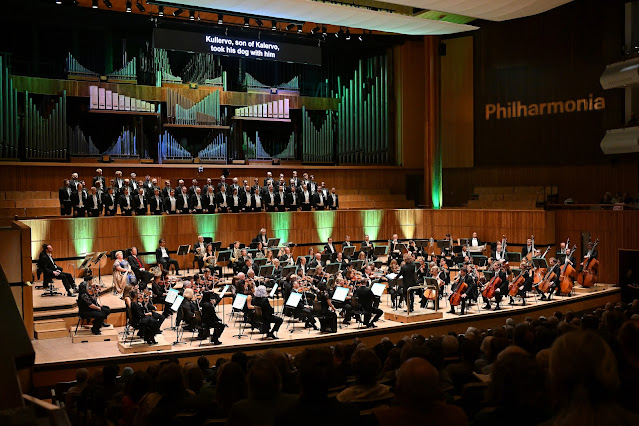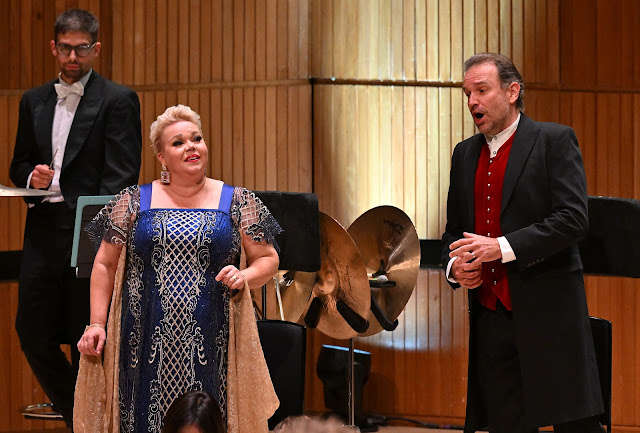 |
| Akseli Gallen-Kallela: Kullervo Sets Off for War (Mural, 1901, in the Old Student House, Helsinki University) |
Sigfúsdóttir: Oceans, Grieg: Piano Concerto; Sibelius: Kullervo; Stephen Hough, Johanna Rusanen, Tommi Hakala, Ylioppilaskunnan Laulajat (YL) Male Voice Choir, Philharmonia, Santtu-Matias Rouvali; Royal Festival Hall
Reviewed 26 September 2024
A contemporary composer spanning orchestral and post-rock, and two 19th century composers balancing Nationalism and the Germanic symphonic tradition. A fascinating start to Nordic Soundscapes
Sibelius’ Kullervo remains an intriguing, sprawling and sometimes mesmerising work whose importance is immense. It premiered in 1892, only the second large-scale symphonic work to come out of Finland and an important way-marker in the country’s musical history and journey to political independence. But the work does not occupy a place on concert platforms as often as it might.
On Thursday 26 September 2024, Santtu-Matias Rouvali and the Philharmonia opened their 2024/25 season at the Royal Festival Hall with the first concert in their Nordic Soundscapes season, performing María Huld Markan Sigfúsdóttir‘s Oceans, Edvard Grieg’s Piano Concerto with soloist Stephen Hough and Jean Sibelius’ Kullervo with soprano Johanna Rusanen, baritone Tommi Hakala and Ylioppilaskunnan Laulajat (YL) Male Voice Choir.
 |
| Sibelius: Kullervo – Johanna Rusanen, Tommi Hakala, Ylioppilaskunnan Laulajat Male Voice Choir, Philharmonia, Santtu-Matias Rouvali – Royal Festival Hall (Photo: Philharmonia/Mark Allan) |
It was a long concert, Kullervo lacks the concision of Sibelius’ later symphonic utterances, the young Sibelius had been listening to a bit too much Bruckner in Vienna. There was a sneaking suspicion that, perhaps, we did not quite need another performance of Grieg’s eternal piano concerto, but then that was to countered by the remarkable charisma that soloist Stephen Hough.
We began with Oceans by the Icelandic composer María Huld Markan Sigfúsdóttir whose career combines writing contemporary symphonic music with orchestrating the band, Sigur Rós’ 2023 album Átta and performing in the post-rock group Amlina. But Oceans had nothing of what we might think of as cross-over or post-rock in it. Written in 2018, it explored the sound and idea of the ocean. It began with high suspended sounds, clusters gradually growing as if we were listening to the ocean’s surface. Though gradually the music grew, the sense of this stasis continued and what Sigfúsdóttir did throughout the piece was to preserve this sense of high stasis whilst underneath turmoil and roiling waves grew and died and grew and died. The result was a welter of magical sounds, there were climaxes but the overall feel was something slow moving and mesmerising.
Like Sibelius’ Kullervo, Grieg’s Piano Concerto is an early work and both are complex negotiations between the composer’s burgeoning sense of nationalism and the conventional Germanic symphonic structure. Whereas Sibelius would go on to recast the symphony in his own form, Grieg never again felt the need to write on such a symphonic scale, and for me part of the concerto’s charm are the more intimate moments when the writing seems to be closer to Grieg’s subsequent explorations of his Norwegian heritage.
Stephen Hough began with a compelling, fierce account of the opening gesture, and throughout the first movement his attention to the music’s detail and articulation was remarkable, he often brought a sense of a characteristic piece rather than romantic barnstormer. There were big romantic moments, but quite often Hough seemed to be saying listen again. He was finely supported by Rouvali and the orchestra, who brought a lovely rhythmic bounce to their opening material. The second movement combined a warmly expansive orchestra with some pure piano magic, then we went straight into the perky dance of the finale, both soloist and orchestra bringing out the Norwegian dancing delight. In the more romantic second subject, Hough played with that sense of freedom that characterised his whole performance. We were treated to an encore, Sinding’s Rustle of Spring!
Kullervo is a strange, sprawling work. A five-movement symphony that includes voices, yet the substantial first two movements are purely orchestra and though soprano and baritone soloists have significant roles in the third movement, what we take away from a performance is the remarkable writing for the male voice chorus. Here we had the YL Male Choir, established in 1883 as the Helsinki University Chorus and the chorus that took part in the premiere of Kullervo (and many other performances since).
Rouvali and the orchestra opened the Introduction with a warm enticing sound. Yet Rouvali brought out the restless, questing nature of the music, it never quite settled yet symphonically were were aware that the young Sibelius did not quite know how to shape his thoughts, the writing lacked his later concision. Kullervo’s Youth continued the same sound world, yet at times this was uncompromising and Rouvali encouraged a remarkable sense of aggression from his wind soloists in the moments evoking woodland calls. For all the aggression and drama, the music did reach a sort of resolution. For Kullervo and his Sister the substantial chorus stood up and almost glared at us. Singing without music, they transfixed us, and their singing was terrific. Strong and intensely focused, the chorus part is almost choral chant and here the men brought wonderful sense of articulation to the words, and there are lots of those. The result was a sort of impassive narration, under which Rouvali encouraged his warmly expressive, and still questing orchestra. The solo roles are small, but important. Johanna Rusanan was vivid and fierce in her solos culminating in a compelling account of her narrative. Tommi Hakala was intense, his final utterance almost a wail, yet it was the implacable orchestra that had the final say.
 |
| Sibelius: Kullervo – Johanna Rusanen, Tommi Hakala, Philharmonia – Royal Festival Hall (Photo: Philharmonia/Mark Allan) |
The narrative here is a strange choice, how the anti-hero Kullervo forces himself on a woman then discovers she is his sister! The outcome is a killing spree which was depicted in a rather Brucknerian scherzo, with only the brass writing suggesting the movement’s title, Kullervo goes to war. For the final movement, Kullervo’s Death the male voice chorus returned with an implacable yet profoundly moving account of Kullervo’s suicide. Complemented by sometimes eerie orchestral writing, the whole was a fascinating ecosystem whereby the chorus did not carry the whole narrative, and much depended on the powerful performance of Rouvali and the orchestra, yet throughout the YL Male Voice Choir were compelling.
The blog is free, but I’d be delighted if you were to show your appreciation by buying me a coffee.
Elsewhere on this blog
- Investing in the magic of Purcell’s music: The Fairy Queen from The Sixteen at Cadogan Hall – opera review
- High-quality music-making & imaginative programming in the special natural setting of Exmoor & Dartmoor: I chat to Tamsin Waley-Cohen of the Two Moors Festival – interview
- A superb sense of community: Mascagni’s Cavalleria Rusticana at Blackheath Halls Opera – opera review
- Remembrance and renewal: Peter Seabourne’s My Song in October – record review
- Both audience & player go on a journey together: Latvian pianist Reinis Zariņš discusses Messiaen’s Vingt Regards which he performs at the London Piano Festival – interview
- Celebrating Jommelli in style: Ian Page & The Mozartists make a compelling case for this neglected music – concert review
- Fire and water in the library: Siren Duo in an imaginative flute and harp recital for Temple Music – concert review
- An interview with the Snow Maiden: I chat to Ffion Edwards about taking on the title role in Rimsky Korsakov’s opera with English Touring Opera – interview
- A journey of remarkable emotional depth: Laurence Kilsby and Ella O’Neill at Wigmore Hall – concert review
- Engaging charm: Bampton Classical Opera in a delightful version of Alcina that does not take itself too seriously – opera review
- Home


.png?w=998&resize=998,665&ssl=1)





